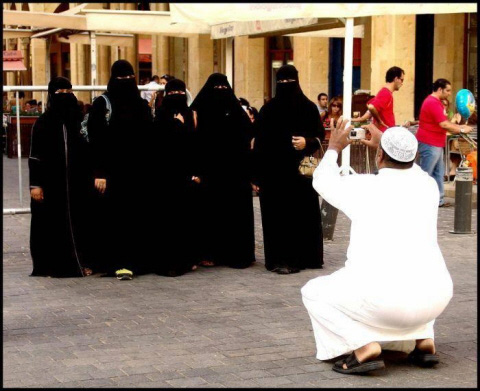

04/11/2011
I’ve long thought the Islamic burqa was not so much about modesty as erasing women’s individuality. Otherwise, the all-inclusive sack would not need to be identical. 
Of course, women as non-individual replaceable parts fit particularly well in Islamic societies, which are polygamous and where divorce is easy for men but hard for women.
The video below reflects the individuality issue well:
The burqa is a simmering issue in France, where covering one’s face in public becomes illegal on April 11.
Galliawatch translated part of a related article from L’Express, in which a young Muslim fellow declared his faith in demography:
“We are at home, France will soon belong to us. There are already 10 million of us, soon there will be 20 million, you’ll see. You will not be able to stop us from doing anything. This country is ours.”
Nevertheless, the French authorities arrested dozens of the Muslims who staged a protest against the new law.
61 arrested over banned Paris Muslim veil protest, Associated Press, April 9, 2011
Police on Saturday arrested 61 people — including 19 women — for attempting to hold an outlawed Paris protest against France’s pending ban on face-covering Islamic veils, a top police official said.
Fifty-nine people were detained while trying to demonstrate at Place de la Nation in eastern Paris, as were two others while traveling there from Britain and Belgium, said Nicolas Lerner, chief of staff for the Paris police chief.
The arrests come amid in a rising, if small, groundswell of controversy over Monday’s start of an official ban of garments that hide the face, which includes Muslim veils such as the slit-eyed niqab and the full face-covering burqa. Women who disobey the law risk a fine, special classes and a police record.
The demonstrators rallied in defiance of a ban of the protest ordered Friday by Paris police on the ground that a Muslim group’s call for the rally was “clearly an incitement to violence and racial hatred,” said Lerner.
”The demonstration was not banned because of the practice (among some Muslim women) of wearing veils, but because of the speech,” he said, adding that Jewish groups and others had planned counter-protests — raising the prospect of public disorder.
Most of the would-be protesters were released after being taken to police stations, though six remained in custody — mostly on suspicion of being in France illegally, Lerner said.
The two would-be protesters who had tried to arrive from Britain and Belgium were known to French authorities. Police were under existing orders to stop and expel them, if they tried to reach France, Lerner said.
Lerner identified the man who had traveled from Britain as Anjem Choudary, the head of Islam4UK until it was banned earlier this year by Britain’s government for glorifying al-Qaida. Several people associated with the group have been linked to terrorist acts.
The protest was called by a group known as Unicite Tawhib, which has been linked to Internet sites that call for Islam to dominate France and the world, Lerner said.
Secular France has been in the throes of a debate about the role of religion in its society. Many Muslims have felt stigmatized by a 2004 law that banned Islamic headscarves in classrooms and during the intense debate that preceded the adoption of the face-veil ban last year.
The measure forbids women to hide their faces in public places, even in the streets. Violators could face a fine of euro150 ($215) or a citizenship course — or both. Anyone found forcing a woman to cover her face risks a year in prison and a euro30,000 fine ($43,000), and possibly twice that if the veiled person is a minor.
Authorities estimate at most 2,000 women in France wear the outlawed veils. France’s Muslims number at least 5 million, the largest such population in western Europe.